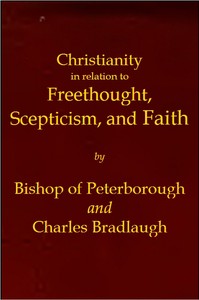Christianity in relation to Freethought, Scepticism, and Faith by Magee et al.
"Christianity in relation to Freethought, Scepticism, and Faith" by Magee et al. is a collection of religious discourses written in the early 19th century. The work presents a dialogue between the Bishop of Peterborough and the freethinker Charles Bradlaugh, exploring the complex interactions between religion, skepticism, and free thought. Central to the text is the challenge posed by modern skepticism towards traditional Christian beliefs and the responses from the Christian side aimed
at reaffirming their faith. The opening of this discourse presents the context for a series of sermons delivered by the Bishop, focusing on the themes of Christianity and its relation to freethought and skepticism. The Bishop uses the biblical story of Thomas as an illustration of doubt, asserting that genuine belief cannot exist without some measure of faith despite uncertainties. In his address, he seeks to understand the motivations of skeptics while defending Christian doctrine against modern forms of disbelief. The first responses from Bradlaugh critique the Bishop's arguments, emphasizing that the skepticism he represents is not inherently unreasonable and challenges the notion that faith must be devoid of reasoning or evidence. Overall, the introduction frames a significant debate between established religious views and the rise of freethinking ideologies, establishing the parameters for the discourses to follow. (This is an automatically generated summary.)
Read or download for free
| Reading Options | Url | Size | |||
|---|---|---|---|---|---|
| Read now! | https://www.gutenberg.org/ebooks/64503.html.images | 220 kB | |||
| EPUB3 (E-readers incl. Send-to-Kindle) | https://www.gutenberg.org/ebooks/64503.epub3.images | 242 kB | |||
| EPUB (older E-readers) | https://www.gutenberg.org/ebooks/64503.epub.images | 242 kB | |||
| EPUB (no images, older E-readers) | https://www.gutenberg.org/ebooks/64503.epub.noimages | 141 kB | |||
| Kindle | https://www.gutenberg.org/ebooks/64503.kf8.images | 312 kB | |||
| older Kindles | https://www.gutenberg.org/ebooks/64503.kindle.images | 292 kB | |||
| Plain Text UTF-8 | https://www.gutenberg.org/ebooks/64503.txt.utf-8 | 207 kB | |||
| Download HTML (zip) | https://www.gutenberg.org/cache/epub/64503/pg64503-h.zip | 245 kB | |||
| There may be more files related to this item. | |||||
Similar Books
About this eBook
| Author | Magee, William Connor, 1822-1891 |
|---|---|
| Author | Bradlaugh, Charles, 1833-1891 |
| Contributor | Cooper, Robert A. |
| Contributor | Goulburn, Edward Meyrick, 1818-1897 |
| Title |
Christianity in relation to Freethought, Scepticism, and Faith Three discourses by the Bishop of Peterborough with special replies by Mr. C. Bradlaugh |
| Credits | Transcribed from the [1873] Austin and Co. edition by David Price |
| Reading Level | Reading ease score: 62.7 (8th & 9th grade). Neither easy nor difficult to read. |
| Language | English |
| LoC Class | BT: Philosophy, Psychology, Religion: Christianity: Doctrinal theology, God, Christology |
| Subject | Apologetics |
| Subject | Free thought |
| Subject | Christianity -- Controversial literature |
| Subject | Skepticism |
| Category | Text |
| EBook-No. | 64503 |
| Release Date | Feb 8, 2021 |
| Most Recently Updated | Oct 18, 2024 |
| Copyright Status | Public domain in the USA. |
| Downloads | 263 downloads in the last 30 days. |
| Project Gutenberg eBooks are always free! | |

